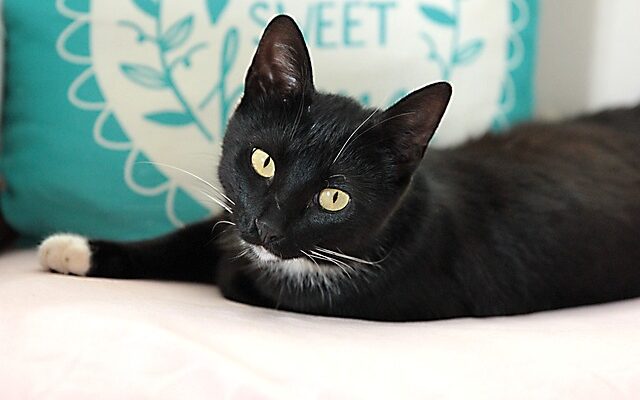Why is my cat peeing in my plants?
If you have noticed your cat peeing in your plants, it can be frustrating and concerning. This behavior may indicate an underlying issue that needs to be addressed. There are several reasons why your cat might be urinating in your plants, and understanding these reasons can help you find a solution.
One possible reason for this behavior is that your cat is marking territory. Cats have scent glands in their paws, and by urinating in your plants, they are leaving their scent and marking their territory. This behavior is more common in unneutered males, but females can also exhibit this behavior.
Another possible reason is that your cat is experiencing a medical issue. Urinary tract infections, bladder stones, or other urinary issues can cause discomfort and increase the frequency of urination. If your cat is peeing in your plants and also displaying other symptoms such as frequent trips to the litter box, straining or crying during urination, or blood in the urine, it is important to consult a veterinarian.
Stress or anxiety can also lead to inappropriate urination. Cats are sensitive animals, and changes in their environment or routine can cause them to feel stressed. This can include the introduction of a new pet, a move to a new home, or a change in the household dynamics.
To address this behavior, it is important to first rule out any medical issues by taking your cat to the veterinarian. If a medical issue is not the cause, you can try the following solutions:
1. Provide multiple litter boxes in different areas of the house.
2. Ensure the litter box is clean and easily accessible.
3. Use pheromone sprays or diffusers to reduce stress.
4. Give your cat plenty of attention and playtime to alleviate anxiety.
5. Provide scratching posts or cat trees to help redirect their need for territory marking.
By understanding the reasons behind your cat’s behavior and implementing appropriate solutions, you can help prevent your cat from peeing in your plants and create a harmonious living environment for both you and your feline friend.

Possible reasons behind cat urinating in plants
if possible reasons behind cat urinating in plants. Use these suggestions:
Title: Possible Reasons Behind Cat Urinating in Plants – Understanding Feline Behavior
Introduction:
Cat owners may often find their furry friends choosing their indoor or outdoor plants for their natural urge to urinate. While this behavior can be frustrating, it is essential to understand the reasons behind it. In this article, we will explore some possible explanations for why your cat might be using your beloved plants as their personal restroom.
1. Marking Territory:
Cats have a strong instinct to mark their territory. By urinating on plants, they leave their scent and signal to other animals that the area is their territory. This behavior is more common in unneutered or unspayed cats, as hormones play a role in territorial marking.
2. Anxiety or Stress:
Cats can experience anxiety or stress due to changes in their environment, such as the introduction of a new pet, a move to a new home, or changes in routine. Urinating in plants can be their way of relieving stress or expressing their discomfort.
3. Litter Box Issues:
If your cat is not using the litter box consistently, they may resort to urinating in plants as an alternative. This could be due to a dirty or crowded litter box, an unsuitable type of litter, or an underlying medical condition such as a urinary tract infection.
4. Natural Instincts:
Cats have an instinct to eliminate in areas with loose, soft soil. The presence of potted plants may closely resemble these natural conditions, tempting them to use them as an outdoor-style litter box.
5. Attraction to Odor or Texture:
Some cats may be attracted to the naturally occurring odors or textures of certain plants. For example, the smell of certain herbs or the texture of soil may trigger their instinct to eliminate in these areas.
Conclusion:
In order to address and prevent your cat from urinating in plants, it is crucial to identify the underlying reason behind their behavior. By understanding their instincts, addressing anxiety or stress, ensuring a clean litter box, and providing suitable alternatives, such as cat-friendly grass or designated outdoor areas, you can redirect your feline friend’s natural urges and create a harmonious environment for both you and your plants.

Frequently Asked Questions (FAQs) about cats urinating in plants
FAQ: Why do cats urinate in plants?
Answer: Cats urinating in plants is a common behavior that can stem from various reasons, including territorial marking, stress or anxiety, a need for attention, or even medical issues. Cats possess a strong sense of smell and are naturally drawn to the scent of soil and plants. Here are some frequently asked questions surrounding this behavior and some helpful information to understand and address the issue.
FAQ: How can I prevent my cat from urinating in my plants?
Answer: To discourage your cat from urinating in plants, consider taking the following steps:
1. Provide an alternative: Offer a designated litter box that is easily accessible and appealing to your cat. Ensure the litter box is clean, with fresh litter, as cats are highly hygiene-conscious.
2. Behavioral modification: Use positive reinforcement and redirect your cat’s attention by providing interactive toys or engaging in play sessions. Rewarding your cat when it uses the litter box can help reinforce desired behaviors.
3. Protect your plants: Cover soil with stones, aluminum foil, or pine cones to create an unpleasant texture, deterring your cat from accessing the plants. Additionally, placing plants in hanging baskets or using cat-safe deterrent sprays may help.
FAQ: Should I consult a veterinarian if my cat continues to urinate in plants?
Answer: If your cat’s behavior persists despite behavioral modifications, it’s advisable to consult a veterinarian. Cats that urinate outside the litter box may have underlying health issues such as urinary tract infections, bladder stones, or kidney problems. A veterinarian can conduct a thorough examination and provide the appropriate medical intervention if necessary.
Remember, each cat is unique, and understanding the reasons behind their behavior is crucial. By addressing the root cause and providing appropriate alternatives, you can help prevent cats from urinating in plants and create a harmonious environment for both you and your feline friend.

Tips for preventing and managing cat peeing in plants
Tips for preventing and managing cat peeing in plants can be a lifesaver for pet owners who have indoor cats and love to have houseplants. Cats have a natural instinct to use soil as a litter box, which can lead to unwanted behaviors and damage to your precious plants. However, with the right strategies, you can prevent and manage cat peeing in plants effectively.
Firstly, it’s essential to provide your cat with a proper litter box environment. Make sure the litter box is clean, easily accessible, and in a quiet area. Experiment with different types of litter to find what your cat prefers. If your cat has a preference for your plants, you can try using cat-friendly deterrents such as citrus peels or aluminum foil around the plants to discourage them from approaching.
Another effective strategy is to provide your cat with alternative scratching and digging options. Cats naturally need to scratch and dig, so providing them with suitable outlets can reduce their desire to do so in your plants. Invest in scratching posts and provide an area with loose soil or a box filled with cat-friendly material like shredded paper for them to dig in.
In addition, you can place physical barriers around your plants. This could be as simple as placing decorative rocks or small stones on the soil’s surface, making it difficult for the cat to dig. You can also try using a mesh or chicken wire to surround the plants, ensuring the cat cannot access them.
Regular play and exercise sessions can also help redirect your cat’s energy. By engaging them in interactive playtime, they will release energy and be less inclined to use your plants as a litter box.
Consistency is key when managing cat peeing in plants. Reinforce positive behaviors and discourage negative ones. If your cat does pee in a plant, clean it promptly with an enzymatic cleaner to remove the scent and discourage future accidents.
By implementing these tips, you can create a harmonious environment where your indoor cat and houseplants can coexist peacefully.

Seeking professional help for resolving the issue
Seeking professional help for resolving the issue is crucial in various aspects of life. Whether you are facing a personal problem, a health issue, or a professional challenge, professional assistance can provide you with the guidance and support you need to overcome the obstacles you are facing.
Professional help offers several benefits. First, professionals possess the knowledge and expertise required to effectively address your specific problem. They have undergone extensive training and have hands-on experience in their respective fields. This expertise allows them to understand the underlying causes of your issue and develop a tailored plan to help you overcome it.
Moreover, seeking professional help provides an objective perspective on your situation. Often, when we are immersed in our own problems, it can be challenging to think clearly and objectively. A professional can offer an unbiased viewpoint, helping you to gain fresh insights and identify alternative solutions that you may not have considered before.
Additionally, by seeking professional help, you gain access to a supportive network. Professionals are skilled at providing emotional support, offering a safe space for you to express your thoughts and feelings. They can also connect you with other individuals who may be going through similar challenges, providing a sense of community and solidarity.
From an SEO-friendly perspective, it is essential to include relevant keywords throughout the description to improve visibility in search engine results. This could include terms such as “professional help,” “resolving issues,” “expertise,” and “guidance.” Using these keywords naturally within the content will help search engines identify the relevance of the description to user queries.
In conclusion, seeking professional help is a valuable resource for resolving problems in various areas of life. With their expertise, objectivity, and support, professionals can guide you towards overcoming your challenges and achieving a positive outcome.

